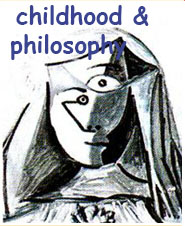una lengua otra: el decir infantil
DOI:
https://doi.org/10.12957/childphilo.2016.26175Palabras clave:
Infância, Dizer infantil, ExperiênciasResumen
Este trabajo rescata un “decir infantil” y fue presentado en la última sección de la investigación de maestría, realizada entre 2014 y 2016 en el Programa de Posgrado en Educación en la Universidad Federal de Alagoas (PPGE/UFAL), cuyo tema trae “Los enigmas de la infancia y experiencias en una escuela pública de la ciudad de Maceió/AL: ¿qué revelan?”. Por lo tanto, esta investigación es un deseo inaugural de pensar la niñez en el estado brasileño de Alagoas. Buscamos en este estudio conocer la vida cotidiana de los niños para problematizar qué enigmas permean el tema de la niñez y la experiencia. Para esta investigación, establecemos un diálogo con el niño según Nietzsche, a partir del personaje Zaratustra en la visión “Las tres metamorfosis”. Con Kohan (2007, 2011), se hace una lectura infantil de la niñez, en un tiempo sin determinación; el “tiempo aión” del niño según Heráclito. Larrosa (2009, 2013) nos trae otra comprensión de la experiencia a la vez que, como el niño de Nietzsche y la niñez en Kohan (2007, 2011) viene a interrumpir una comodidad lingüística que busca ser coherente y verdadera. El tema de este simposio Mundos que se tecem entre “nosotros”: o ato de educar em uma língua ainda por ser escrita, nos cambia, a medida que nos obliga a renunciar (aunque momentáneamente) a la lengua adulta de la filosofía y nos lanza al riesgo de escribir y escuchar en un lenguaje infantil. En esta perspectiva, este trabajo aporta uno de los registros de dicha investigación. En él, hay un “decir infantil” que dibuja una escuela pública desde sus propias experiencias y cuyo idioma no puede ser descifrado. Tampoco podría.Descargas
Los datos de descargas todavía no están disponibles.
Descargas
Publicado
2016-11-17
Número
Sección
artículos
Licencia
el copyright de cada artículo pertenece a cada autor. childhood & philosophy tiene el derecho a la primera publicación. el permiso de reimprimir cualquier artículo que haya aparecido en la revista necesita de la autorización escrita del autor. en adisión a cualquier forma de reconocimiento requerido por el autor el siguiente aviso debe ser añadido a la declaración de permiso en la reimpresión (con los números apropiados a los puntos suspensivos): [título del artículo] fue publicado originalmente en la infancia y la filosofía, tomo ..., número ..., pp. ...-...



